Scott Timberg's Blog, page 36
May 30, 2014
Amazon vs. Hachette Fatal to Non-Superstar Authors
SO far most of the coverage of the battle between Amazon and the Hachette publishers has looked at the impact on bestselling authors like James Patterson and J.K. Rowling, whose work becomes harder to get or impossible to pre-order during the current feud. But a new story argues that the writers really hurt by this are lesser known and first-time writers. The Al Jazeera America piece judges that, “while a battle between book industry titans is unlikely to affect the standing of such well-established writers, it is potentially ruinous to the careers of first-time authors being published by Hachette this month.” Writes Alessandra Bastagli:
Industry insiders say the window of opportunity for a debut to establish a new author is during the first three weeks after publication. If s
ales are poor (and without Amazon, which is responsible for an average 50 to 80 percent of all sales, they very likely will be), a book is potentially dead out of the gate.
“As a first-time author, you have so much to prove — that you can produce a good book, but then that it can actually sell,” said author Daniel Schulman. “If my book isn’t seen as a success, regardless of the reason, it can affect my ability to sell a second one.”
At Book Expo in New York’s Javits center, the tussle has become the most frequent topic of conversation.
The story, by the way, is by my editor at AJAM, who knows her stuff. She worked previously as an editor at the Free Press.
May 29, 2014
The Savage Brilliance of Jo Nesbo
THE Norwegian crime writer Jo Nesbo is being read and discussed on our shores these days, with a new novel, The Son, out earlier this month. (The book, set in Oslo, is not one of those built around troubled detective Harry Hole.
I spoke to Nesbo when he and his publisher were making a big push into the U.S. market in the wake of Stieg Larsson’s books. At the time, it wasn’t cl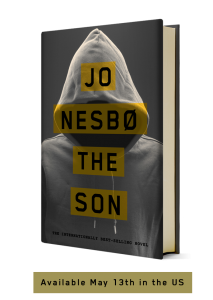 ear if it would work. But I think it’s fair to say that Nesbo has found a following in the States. For what it’s worth, he was publishing novels in Scandinavia, to some acclaim, years before Larsson’s Girl With the Dragon Tattoo came out.
ear if it would work. But I think it’s fair to say that Nesbo has found a following in the States. For what it’s worth, he was publishing novels in Scandinavia, to some acclaim, years before Larsson’s Girl With the Dragon Tattoo came out.
Here is my piece, in which he taked about reading Jim Thompson’s The Killer Inside Me.
“I wasn’t that into crime novels at all,” he says, “but a friend introduced me to the work of Jim Thompson — I loved all his books. When I read [Raymond] Chandler, it was a bit comic, these romantic, melancholy monologues. To me, Thompson was braver, more extreme.”
I like Nesbo a lot, and found him smart and reflective. He’s also a musician, and I enjoyed speaking to him about alt-country figures like Gillian Welch and David Rawlings.
May 28, 2014
Memories of the Elusive Eric Dolphy
OFTEN I wonder how the pressure on today’s musicians and artists to constantly promote themselves would allow a musician like Eric Dolphy — an introvert dedicated to his craft and someone who remains a kind of enigma — to have a career and achieve even the low level of fame he had in the ’60s. I’m still wondering, but I’m glad to see a revival of interest in the great LA-born multi-reed avant-gardist. His papers have just been acquired by the Library of Congress, and a festival of his music will take place this week in Monclair, New Jersey. Don Byron, Henry Threadgill, bassist Richard Davis (who played on Dolphy’s Out to Lunch album) and others will perform.
Here’s Ben Ratliff’s New York Times story, describing the importance of the papers: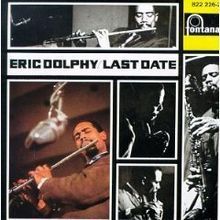
It also holds a key to how he thought and what he practiced: his transcriptions of other music, including bits of Charlie Parker and Stravinsky; Bach’s Partita in A minor for flute; and a bass-clarinet arrangement for Bach’s Cello Suite No. 1. There are also many scales of Dolphy’s own devising, which he was using as the basis for improvisation; practice books and lead sheets; and a page of transcriptions of bird calls.
“The thing that really astounded me,” Mr. Newton said recently, “was that this was a person who thought very profoundly about the organization of his music.” Dolphy wrote out hundreds of his altered or “synthetic” scales… “Eric was developing multiple styles of music simultaneously,” Mr. Newton continued. “There was this highly chromatic post-bop; then music that combined elements of jazz and contemporary classical; and jazz combined with world music.”
Between his solo work, his recordings with Coltrane, his stuff with Mingus, I’m left pondering what this expansive and eclectic artist might have produced if he’d lived beyond the age of 36.
Amazon’s Fight With Publisher Heats Up
THE battle between the online bookselling giant and the Hachette publishers has taken a nasty turn: Amazon has removed the pre-order button for some books, has removed the discount it usually offers for others, and is fighting with publishers over profits on ebooks. Bestselling writers like James Patterson, J.K. Rowling (pictured) and detective novelist Ian Rankin are getting tangled up in the mess. (On Amazon US, you currently cannot pre-order 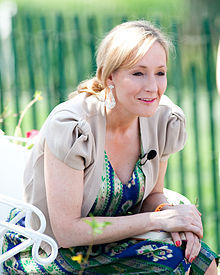 The Silkworm, the new Rowling novel which is due in a few weeks.)
The Silkworm, the new Rowling novel which is due in a few weeks.)
As a Guardian article has it:
For other authors such as Rankin, Amazon has removed the discounting that helps shift titles: the hardcover version of the latest Rebus is for sale at £7 on Amazon.co.uk, but on Amazon.com will set you back $26 (£15.50). Other retailers are discounting it, including Barnes & Noble, which offers the title in the US for $16.85 (£10). Other writers caught in the crossfire appear to include Jeffrey Deaver, Anna Holmes and Joshua Ferris. A Hachette spokeswoman confirmed that Amazon had removed discounts from a number of its titles in America.
“There is a huge monopoly in Amazon. This dimension of power is something we haven’t seen before and what they are doing must be an abuse of power,” said literary agent Clare Alexander, who represents Mark Haddon, author of The Curious Incident of the Dog in the Night Time.
The new aggressiveness by Amazon seems motivated by Wall Street’s impatience with the company’s inability to make a consistent profit; share prices are down more than 20 percent from this time last year.
The articles suggests that Hachette, owned by a large French corporation, may have the muscle to fight back at least a little bit. I continue to wonder where anti-trust folks are.
May 27, 2014
Jaron Lanier on Moore’s Law
I’M going back to the work of the dreadlocked writer/musician/digital skeptic this week because of a conversation that will appear soon. He’s got a great few lines near the beginning of Who Owns the Future? — recently out in paperback — that sums up Moore’s Law, as well as what’s called Baumol’s Curse, about as succinctly as I can imagine. Moore’s Law, at its most basic, describes the vast expansion of computing capacity over time; supposedly, its speed or power doubles  every year and a half or two.
every year and a half or two.
Moore’s Law means that more and more things can be done practically for free, if only it weren’t for those people who want to be paid. People are the flies in Moore’s Law’s ointment. When machines get incredibly cheap to run, people seem correspondingly expensive. It used to be that printing presses were expensive, so paying newspaper reporters seemed like a natural expense to fill the pages. When the news became free, that anyone would want to be paid at all started to seem unreasonable. Moore’s Law can make salaries — and social safety nets — seem like unjustifiable luxuries.
The dynamic has pretty clear implications for the creative class.
My new piece on Lanier will run soon; watch this space.
Offshoring Hollywood Musicians
WHAT could be the first skirmish in a larger war is shaping up in Hollywood, where L.A. musicians are protesting a studio’s hiring of foreign musicians. The protestors are telling the Lionsgate studio, which distributes the Hunger Games movies, to “stop sending musicians’ jobs overseas.” It comes after a protest by the American Federation of Musicians against offshoring by Marvel Studios. From Richard Verrier’s story:
The unrest comes at a time of growing anxiety in the local music industry, where film and television work have been a key source of income for hundreds of local violinists, cellists, trombonists and other professional musicians. Many use the entertainment work to supplement what they earn from working in local symphonies, chamber groups and the L.A. Opera.
The great burgeoning of West Coast jazz in the late ’40s and ’50s took place partly because television and movie studios attracted musicians to L.A. and k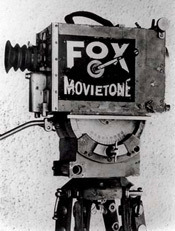 ept them employed; many played in studio bands by day and stretched out in more adventurous jazz groups by night. It’s kept L.A. music scene robust over the decades. But that may be changing, with earnings cut in half in just seven years:
ept them employed; many played in studio bands by day and stretched out in more adventurous jazz groups by night. It’s kept L.A. music scene robust over the decades. But that may be changing, with earnings cut in half in just seven years:
On any given day, about 2,000 members of AFM Local 47 will work on a film or TV show. But their earnings have fallen substantially in recent years. In 2007, union members collectively made $30 million in wages. Now, they earn about $15 million a year, according to Local 47, which represents 7,400 musicians, arrangers and copyists.
Atypically, the musicians and the studio execs are on the same side here, at least in one aspect: Both are lobbying for California to expand its tax credit to
For journalists, photographers and other members of the creative class, the withering of film-music employment is all too familiar.
May 23, 2014
Art Critic Kenneth Clark: Savior or Snob?
IT’S always easy to look back at cultura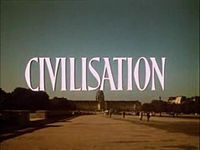 l figures from earlier eras and denounce them as “elitists,” and that’s clearly what’s happened to the great British art critic and interpreter Kenneth Clark. Through books on landscape and the nude, and his BBC television documentary series from 1969, Civilisation, Clark exposed an enormous number of people to art and ideas, clearly and intelligently. (I was too young to really experience his heyday, but one of Clark’s American inheritors, Carl Sagan, was a childhood hero of mine. And the Civilisation book is wonderful.)
l figures from earlier eras and denounce them as “elitists,” and that’s clearly what’s happened to the great British art critic and interpreter Kenneth Clark. Through books on landscape and the nude, and his BBC television documentary series from 1969, Civilisation, Clark exposed an enormous number of people to art and ideas, clearly and intelligently. (I was too young to really experience his heyday, but one of Clark’s American inheritors, Carl Sagan, was a childhood hero of mine. And the Civilisation book is wonderful.)
A new article in the Guardian takes stock of the man’s accomplishments and reputation, judging him to have gone into eclipse in part because of assaults by the Marxist critic John Berger.
Berger’s brilliant TV series and book Ways of Seeing (1972) threw down a lethal Marxist-feminist gauntlet to Clark’s Olympian worldview. Clark is the only art historian to be named, and he is cited and ticked-off twice over. His description of Gainsborough’s portrait of Mr and Mrs Andrews on their country estate in Landscape into Art (1949) as “enchanting” and “Rousseauist” is denounced: “They are not a couple in Nature as Rousseau imagined nature. They are landowners and their proprietary attitude towards what surrounds them is visible in their stance and their expressions.” Berger well knew that Clark, thanks to substantial inherited wealth (the family fortune came from Paisley cotton), had lived since 1955 in Saltwood Castle in Kent surrounded by a moat and a large art collection that included old masters and impressionists.
My politics are probably closer to Berger’s than to Clark’s. But when writers who address a broad non-academic audience like Clark (or Jacob Bronowski, or Sagan) are shoved aside for ideological reasons, because they are deemed middlebrow, or whatever — culture becomes a minority interest. We move closer to all Miley all of the time.
“Above all, perhaps, Clark was a brilliant wordsmith, the most seductive writer on art since Ruskin and Pater, whom he greatly admired,” James Hall writes near the end of his piece. “Today, when most art historians write as joylessly as lawyers and accountants, such verve is sorely needed.”
Scott Timberg's Blog
- Scott Timberg's profile
- 7 followers



